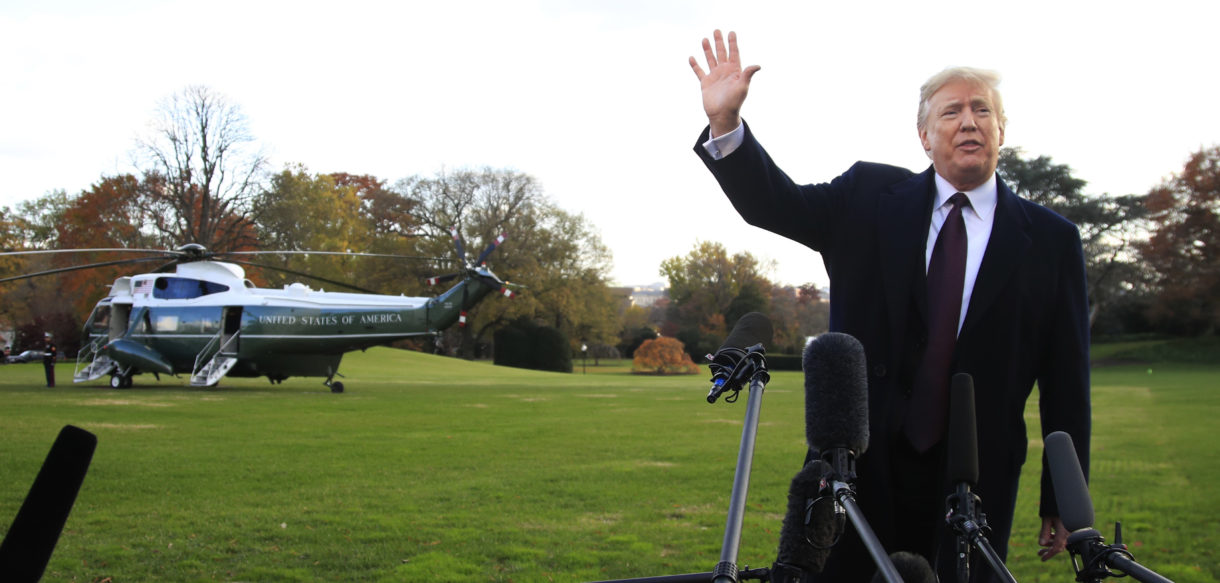President Trump has made explicit that the U.S. relationship with Saudi Arabia will be defined by business deals and a shared opposition to Iran — and not the killing of journalist Jamal Khashoggi.
“If we abandon Saudi Arabia, it would be a terrible mistake,” Trump told reporters outside the White House on Tuesday. “We’re with Saudi Arabia. We’re staying with Saudi Arabia.”
Trump has made the Saudi alliance a cornerstone of his Middle East policy. The kingdom, in turn, is the biggest buyer of U.S. weapons and shares the president’s belief that Iran is the greatest threat to the region.
But Khashoggi’s death last month at the Saudi Consulate in Istanbul ignited a firestorm of international criticism directed at the Saudi leadership, with some members of Congress calling for a halt to arms sales or other penalties against the kingdom.
Trump, however, remains the kingdom’s most important defender, stressing his commitment again on Tuesday.
“The crime against Jamal Khashoggi was a terrible one, and one that our country does not condone,” Trump said. But, he added, “The United States intends to remain a steadfast partner of Saudi Arabia to ensure the interests of our country, Israel and all other partners in the region.”
Many Trump critics acknowledge the importance of the U.S. partnership with Saudi Arabia. But they say this doesn’t mean the U.S. should ignore Saudi actions — like the Khashoggi killing, the war in Yemen and a blockade of Qatar — that they say are further destabilizing the volatile region. Some go even further, asking “Who needs Saudi Arabia?”
The U.S. and the Saudis have a relationship dating to the 1940s that is based on shared strategic interests — like dependable oil supplies coming from the Middle East — rather than shared values like democracy, human rights and a free press.
But rarely, if ever, has this formula been stated by a U.S. president in such stark terms.
“This statement is a stunning window into President Trump’s autocratic tendencies, his limited grasp of world affairs, and his weakness on the world stage,” said Rhode Island Sen. Jack Reed, the top Democrat on the Senate Armed Services Committee. “It is shocking to see President Trump continue to act as an accomplice to a clear cover-up by Saudi leadership.”
Trump’s remarks clarified some questions, raised others and touched off a new barrage of criticism. A few key points:
Trump stressed the primacy of business deals, though his figures can’t be confirmed.
Trump repeated a point he has made before, saying he would not punish the Saudis or U.S. corporations by tearing up deals to buy U.S. military equipment, which he claims are worth $110 billion.
“If we foolishly cancel these contracts, Russia and China would be the enormous beneficiaries — and very happy to acquire all of this newfound business,” the president said.
But the Saudis are dependent on U.S. military equipment and could not easily transition to hardware from another country. And while the Saudis are the biggest U.S. arms buyers, and have a range of other U.S. investments, multiple fact checks show the numbers Trump cites are hugely inflated.
The Saudis have signed new contracts during the Trump administration worth around $4 billion, according to the Brookings Institution. Add in arms sales that have been discussed — but not signed — and the figure may reach $20 billion to $30 billion, analysts say. Still, the administration has not offered evidence to back up the president’s statements.
The president doubled down on the Saudi partnership to confront Iran.
Trump repeatedly cited the threat posed by Iran, which is locked in a decades-long struggle with Saudi Arabia for pre-eminence in the Gulf region.
“The world is a very dangerous place,” the president said at the opening of his statement. He described Iran as the world’s leading sponsor of terrorism and blamed it for many ills in the Middle East.
Yemen’s civil war is one of several conflicts where the Saudis and Iranians wage proxy battles for influence and control. Both are widely criticized for inflaming the war and the humanitarian crisis in Yemen. Trump placed the blame squarely on Iran, saying, “Saudi Arabia would gladly withdraw from Yemen if the Iranians would agree to leave.”
But even if the U.S. suddenly sought to punish Saudi Arabia for the Khashoggi killing, it’s unlikely the Saudi position toward Iran would change. Saudi Arabia and Iran are regional rivals, and the Saudis rely on the U.S. for protection from its neighbor across the Persian Gulf.
The president is again at odds with the intelligence community.
The CIA believes that Saudi Crown Prince Mohammed bin Salman was involved in Khashoggi’s killing, and Trump spoke over the weekend with CIA Director Gina Haspel.
In his statement, Trump framed the question of the crown prince’s involvement this way:
“It could very well be that the Crown Prince had knowledge of this tragic event — maybe he did and maybe he didn’t! That being said, we may never know all of the facts surrounding the murder of Mr. Jamal Khashoggi.”
Saudi Arabia’s crown prince looks more secure.
If the president held the crown prince directly responsible for Khashoggi’s killing, it would damage the relationship between the two countries and could cloud the crown prince’s future.
The crown prince is 33 and in line for the throne. His father, King Salman, is 82 and in poor health. But Trump, whose son-in-law, Jared Kushner, has close ties with the crown prince, gave no indication that the larger relationship would be harmed.
“In any case,” the president said, “our relationship is with the Kingdom of Saudi Arabia.”
Greg Myre is a national security correspondent who spent more than a decade covering the Middle East. Follow him @gregmyre1.
9(MDEwNzczMDA2MDEzNTg3ODA1MTAzZjYxNg004))
